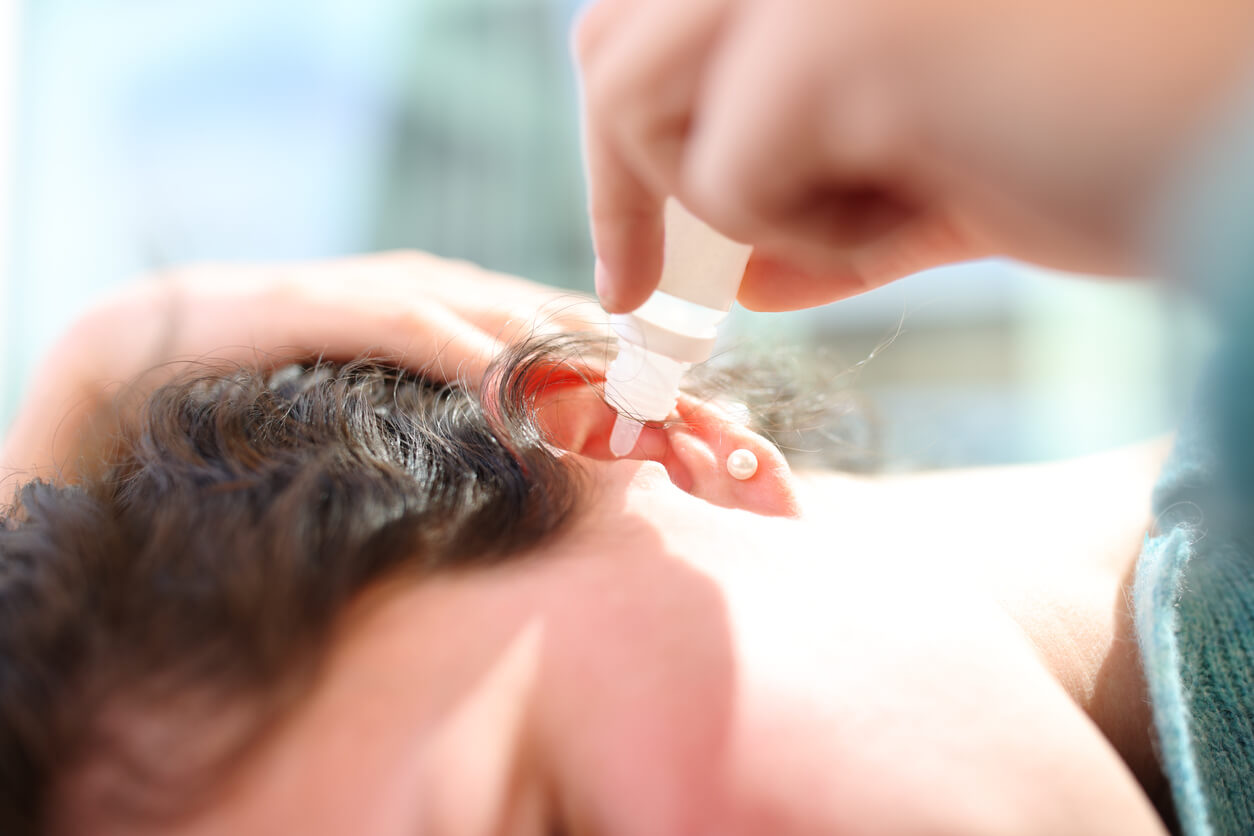Ear Pain During Pregnancy: Causes and Treatment


Written and verified by the nurse Leidy Mora Molina
Ear pain during pregnancy is a manifestation that may appear. It’s usually related to the changes that occur in the body during this stage, which produce either local problems in the ear canal or systemic alterations that affect this area. Here are the main causes of this discomfort and the appropriate treatment during pregnancy.
Ear pain during pregnancy
Ear pain, also called otalgia, is a condition caused by inflammation of the auditory organ. In this sense, the inflammation is known as otitis and is classified according to the place in the ear where it occurs:
- Internal Otitis Interna: This inflammation is due to a bacterial infection of the inner ear. There may be dizziness, nausea, tinnitus, hearing loss, and other symptoms. Swelling may also be caused by alteration of the vestibular nerve. Even so, it’s uncommon.
- Otitis Media: This is the most frequent cause of ear pain during pregnancy. It occurs when the part of the ear behind the eardrum that communicates with the throat through the Eustachian tube becomes inflamed or infected. It’s secondary to colds, flu, or rhinitis.
- Otitis externa: This is when otitis occurs inside the external auditory canal. It can be caused by earwax plugs or by the so-called swimmer’s ear, a product of the accumulation of water in this area when bathing.
During pregnancy, there’s a greater predisposition to suffer this type of discomfort. Physiologically, the pregnant woman’s body is influenced by hormonal changes, which in turn alter other systems, such as the immune system.
This increases the risk of infections such as ear infections, which cause pain in this area, which can range from mild to severe and may be accompanied by other symptoms such as clogging, tinnitus, or decreased hearing acuity; Of course, it depends on where the inflammation is.

What causes ear pain during pregnancy?
As we’ve seen, there are conditions inherent to this stage that increase the risk of certain types of discomfort such as otorhinolaryngological manifestations. Let’s look at some of the causes of ear pain during pregnancy:
- Ear infections: The most common cause of ear pain in pregnancy is infections. During pregnancy, the immune system is altered to prevent the mother’s body from rejecting the fetus. This means there’s a greater predisposition to suffer infections. Then, microorganisms such as bacteria and fungi can enter through the use of swabs or water entering the ear canal during bathing. This condition may be accompanied by fever, plugging, irritation, and moderate to severe pain in the affected area.
- Increased blood volume: The circulating volume of blood during pregnancy increases by 30-50%. This results in more fluid in the body and a higher rate of fluid retention, which can lead to fluid accumulation in the ear, which in turn triggers an infection.
- Flu and colds: During pregnancy, it’s common for mothers to suffer from frequent colds due to the altered immune system. These can cause infection in the middle ear due to the accumulation of mucus in the area, specifically in the Eustachian tube, and cause pain and inflammation.
- Rhinitis: Rhinitis of allergic, infectious, or hormonal origin, called gestational rhinitis, can indirectly cause ear pain. These produce irritation, nasal congestion, and increased mucus production.
It’s normal for ears to hurt and plug up during pregnancy?
Although it’s an annoying symptom, occasional ear pain or ear plugging are something that can occur during pregnancy. In the previous section, we described why they may hurt, but why do they become plugged?
Certainly, nasal tissue, especially its lining, tends to swell during pregnancy due to increased blood flow. This causes the duct that connects the nose to the ears, called the Eustachian tube, to become blocked.
This blockage will result in the uncomfortable sensation of blocked ears. This is usually treated with nasal decongestants. The plugging can also be caused by infection or earwax accumulation.
How is ear pain during pregnancy treated?

The most important thing to do when faced with ear pain in pregnancy is to see a specialist and verify what’s causing it. Generally, it’s a benign condition and subsides after treatment.
Even so, don’t rule out other conditions that can cause hearing discomfort at this stage, such as high blood pressure that causes tinnitus. So, ear pain in pregnancy is treated as follows:
- Over-the-counter analgesics prescribed by the specialist, such as paracetamol.
- If the origin is due to infection, the otolaryngologist will prescribe antibiotic drops to treat it. In case of advanced infection, oral antibiotic treatment may be indicated, with drugs suitable for pregnancy, such as amoxicillin.
- To relieve pain, you can put a warm towel over the affected ear for a few minutes, several times a day.
- If the ear infection and pain are caused by congestion from colds, flu, or allergies, steam inhalations can loosen mucus and relieve pressure and pain. Nasal decongestants and oral antihistamines are also useful.
- A recommended home drop to treat outer ear infections is a combination of isopropyl alcohol and white vinegar. However, it’s important to have the approval of the specialist for its use.
In many cases, otalgia subsides on its own after a few days. Generally, this occurs when it’s due to an increase in pressure secondary to nasal congestion.
It’s important not to self-medicate and to see an otolaryngologist if the discomfort appears during pregnancy. The specialist will make the differential diagnosis and will indicate the possible causes and the appropriate treatment to treat this condition effectively.
Ear pain during pregnancy is a manifestation that may appear. It’s usually related to the changes that occur in the body during this stage, which produce either local problems in the ear canal or systemic alterations that affect this area. Here are the main causes of this discomfort and the appropriate treatment during pregnancy.
Ear pain during pregnancy
Ear pain, also called otalgia, is a condition caused by inflammation of the auditory organ. In this sense, the inflammation is known as otitis and is classified according to the place in the ear where it occurs:
- Internal Otitis Interna: This inflammation is due to a bacterial infection of the inner ear. There may be dizziness, nausea, tinnitus, hearing loss, and other symptoms. Swelling may also be caused by alteration of the vestibular nerve. Even so, it’s uncommon.
- Otitis Media: This is the most frequent cause of ear pain during pregnancy. It occurs when the part of the ear behind the eardrum that communicates with the throat through the Eustachian tube becomes inflamed or infected. It’s secondary to colds, flu, or rhinitis.
- Otitis externa: This is when otitis occurs inside the external auditory canal. It can be caused by earwax plugs or by the so-called swimmer’s ear, a product of the accumulation of water in this area when bathing.
During pregnancy, there’s a greater predisposition to suffer this type of discomfort. Physiologically, the pregnant woman’s body is influenced by hormonal changes, which in turn alter other systems, such as the immune system.
This increases the risk of infections such as ear infections, which cause pain in this area, which can range from mild to severe and may be accompanied by other symptoms such as clogging, tinnitus, or decreased hearing acuity; Of course, it depends on where the inflammation is.

What causes ear pain during pregnancy?
As we’ve seen, there are conditions inherent to this stage that increase the risk of certain types of discomfort such as otorhinolaryngological manifestations. Let’s look at some of the causes of ear pain during pregnancy:
- Ear infections: The most common cause of ear pain in pregnancy is infections. During pregnancy, the immune system is altered to prevent the mother’s body from rejecting the fetus. This means there’s a greater predisposition to suffer infections. Then, microorganisms such as bacteria and fungi can enter through the use of swabs or water entering the ear canal during bathing. This condition may be accompanied by fever, plugging, irritation, and moderate to severe pain in the affected area.
- Increased blood volume: The circulating volume of blood during pregnancy increases by 30-50%. This results in more fluid in the body and a higher rate of fluid retention, which can lead to fluid accumulation in the ear, which in turn triggers an infection.
- Flu and colds: During pregnancy, it’s common for mothers to suffer from frequent colds due to the altered immune system. These can cause infection in the middle ear due to the accumulation of mucus in the area, specifically in the Eustachian tube, and cause pain and inflammation.
- Rhinitis: Rhinitis of allergic, infectious, or hormonal origin, called gestational rhinitis, can indirectly cause ear pain. These produce irritation, nasal congestion, and increased mucus production.
It’s normal for ears to hurt and plug up during pregnancy?
Although it’s an annoying symptom, occasional ear pain or ear plugging are something that can occur during pregnancy. In the previous section, we described why they may hurt, but why do they become plugged?
Certainly, nasal tissue, especially its lining, tends to swell during pregnancy due to increased blood flow. This causes the duct that connects the nose to the ears, called the Eustachian tube, to become blocked.
This blockage will result in the uncomfortable sensation of blocked ears. This is usually treated with nasal decongestants. The plugging can also be caused by infection or earwax accumulation.
How is ear pain during pregnancy treated?

The most important thing to do when faced with ear pain in pregnancy is to see a specialist and verify what’s causing it. Generally, it’s a benign condition and subsides after treatment.
Even so, don’t rule out other conditions that can cause hearing discomfort at this stage, such as high blood pressure that causes tinnitus. So, ear pain in pregnancy is treated as follows:
- Over-the-counter analgesics prescribed by the specialist, such as paracetamol.
- If the origin is due to infection, the otolaryngologist will prescribe antibiotic drops to treat it. In case of advanced infection, oral antibiotic treatment may be indicated, with drugs suitable for pregnancy, such as amoxicillin.
- To relieve pain, you can put a warm towel over the affected ear for a few minutes, several times a day.
- If the ear infection and pain are caused by congestion from colds, flu, or allergies, steam inhalations can loosen mucus and relieve pressure and pain. Nasal decongestants and oral antihistamines are also useful.
- A recommended home drop to treat outer ear infections is a combination of isopropyl alcohol and white vinegar. However, it’s important to have the approval of the specialist for its use.
In many cases, otalgia subsides on its own after a few days. Generally, this occurs when it’s due to an increase in pressure secondary to nasal congestion.
It’s important not to self-medicate and to see an otolaryngologist if the discomfort appears during pregnancy. The specialist will make the differential diagnosis and will indicate the possible causes and the appropriate treatment to treat this condition effectively.
All cited sources were thoroughly reviewed by our team to ensure their quality, reliability, currency, and validity. The bibliography of this article was considered reliable and of academic or scientific accuracy.
- Center for Drug Evaluation and Research. (2020). La FDA recomienda evitar el uso de medicamentos AINE durante el embarazo y a partir de las 20 semanas en adelante porque pueden reducir el nivel de líquido amniótico. U.S. Food and Drug Administration. https://www.fda.gov/drugs/drug-safety-and-availability/la-fda-recomienda-evitar-el-uso-de-medicamentos-aine-durante-el-embarazo-y-partir-de-las-20-semanas
- Chuang, Á., Cantillano, P., Narbona, R., Allende, R., & Nazar, R. (2016). Cambios auditivos durante el embarazo: revisión de la literatura. Rev. Hosp. Clin. Univ. Chile, 103-108. https://search.bvsalud.org/gim/resource/fr/biblio-869427
- Cómo tratar la otitis Naturalmente Durante el Embarazo. (2022). American Pregnancy Association. https://americanpregnancy.org/es/healthy-pregnancy/pregnancy-concerns/treat-swimmers-ear-naturally-pregnancy
- González, J. M. S., Alvarez, M., Pérez, J. A., Loyola, C. N. P., & Poblet, B. L. C. (2011). Cambios fisiológicos durante el embarazo. Su importancia para el anestesiólogo. DOAJ (DOAJ: Directory of Open Access Journals). http://scielo.sld.cu/scielo.php?script=sci_arttext&pid=S1727-897X2011000500011
-
Iñíguez, C., & Sedaghat, S. (2019). Enfrentamiento práctico a patologías otorrinolaringológicas frecuentes durante el embarazo, una revisión de la literatura. Revista de otorrinolaringología y cirugía de cabeza y cuello, 79(2). https://www.scielo.cl/scielo.php?script=sci_arttext&pid=S0718-48162019000200221
- Marín, F., (2005). Manifestaciones otorrinolaringológicas durante el embarazo y su tratamiento. Anales de otorrinolaringología mexicana, 51(4), 164-169. https://www.medigraphic.com/pdfs/anaotomex/aom-2006/aom064e.pdf
- Sherlie, V. S., & Varghese, A. (2013). ENT Changes of Pregnancy and Its Management. Indian Journal of Otolaryngology and Head & Neck Surgery, 66(S1), 6-9. https://www.ncbi.nlm.nih.gov/pmc/articles/PMC3918343/
This text is provided for informational purposes only and does not replace consultation with a professional. If in doubt, consult your specialist.








